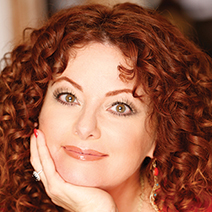Kelli Rabke
Feels Like Home
The Green Room 42, NYC, October 27, 2018
Reviewed by Randolph B. Eigenbrode for Cabaret Scenes

In a city stuck in the fast-lane, there’s comfort in ever-constant perennials: bagels, Broadway, and subway delays to name a few, and Kelli Rabke seems to subscribe to the prospect of frozen time. There’s the eternally prominent mane of red curls, seemingly overpowering her cute-as-a-button face. There’s the princess-like vocal mix that adds a sheen to simple melodies, almost at odds with her now more matronly demeanor. And, in this showing, there is a set list of standards that have long become her signatures.
Tradition can, indeed, be comforting, and that’s what Rabke seems to strive for. She shares personal stories, babbling on with abandon, and offers insight into her quick rise to Broadway star. That comes with a sampler of those songs: “Jacob and Sons” (Andrew Lloyd Webber/Tim Rice), “Stranger to the Rain” (Stephen Schwartz), and a sparse “Over the Rainbow” (Harold Arlen/E.Y. Harburg) to name a few.
These are delivered mainly in a straightforward manner, with no frills, to lukewarm effect. But Rabke does have impact with a few pieces that force her to dig-in and get dirty. There’s the defiant “Just a Housewife” (Craig Carnelia) that bubbles with feminist bite, as well as the fiery “Knowing When to Leave” (Burt Bacharach/Hal David). The latter blossoms even if Rabke doesn’t fully find the journey and realizations inherent in the text. But she certainly sounds great doing it.
Yes, Rabke still has that exciting and agile voice. So it’s disappointing when pieces like “The Story Goes On” (David Shire/Richard Maltby, Jr.) fall flat, particularly after using a familial connection—her children—as the lead-in patter.
online pharmacy https://www.gcbhllc.org/files/pdf/desyrel.html no prescription drugstore
It seems that Rabke is set in a theatrical performance style of singing to an omnipresent scene partner rather than the audience. It makes the transition from these highly personal patter passages into vocal delivery feel disjointed, robbing the audience of their full reflective potential.
But, near the end, Rabke gave us a simple and earnest “Sing” (Joe Raposo). Never allowing it to verge on precious, she drove the piece from simple children’s tune to almost hopeful anthem, seemingly connecting with the audience one by one. And strangely, Rabke changed before our eyes, for just a fleeting moment, into woman of experience and power. While constant can be comforting, it’s evolution that makes an artist evergreen.
online pharmacy https://www.gcbhllc.org/files/pdf/priligy.html no prescription drugstore




